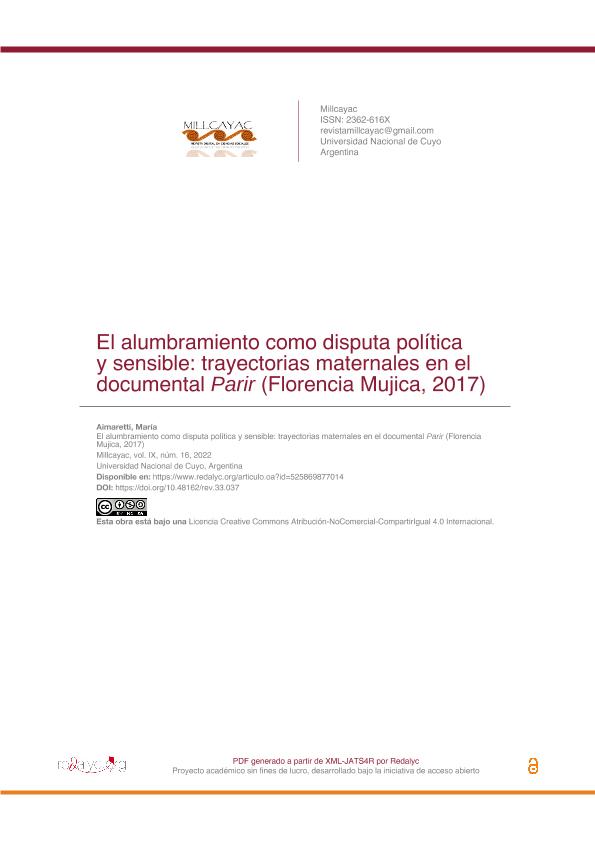Mostrar el registro sencillo del ítem
dc.contributor.author
Aimaretti, Maria Gabriela

dc.date.available
2023-02-03T13:19:36Z
dc.date.issued
2022-03
dc.identifier.citation
Aimaretti, Maria Gabriela; El alumbramiento como disputa política y sensible: Trayectorias maternales en el documental "Parir" (Florencia Mujica, 2017); Universidad Nacional de Cuyo. Facultad de Ciencias Políticas y Sociales; Millcayac; 9; 16; 3-2022; 73-87
dc.identifier.uri
http://hdl.handle.net/11336/186744
dc.description.abstract
Entre la Ley, el sistema sanitario, los cuerpos y la economía estético-visual que rige los medios y la cultura, y en la zona liminal de la familia, existe un “sitio” de colisión, acople, encastre y/o desdibujamiento entre lo público y lo privado: el parto. ¿Qué sucede cuando una decisión íntima —relacionada con la autonomía personal–, y a la vez intensamente doméstica y familiar, como es el modo en que se elige parir, es afectada, intervenida por el Estado, la ciencia, las instituciones y el mercado, bajo el dominio del patriarcado? ¿Cómo con-figura sensiblemente esa tensión el cine vernáculo? Articulando los aportes de los estudios de género y familia, con la historia cultural y los estudios sobre cine, en estas páginas reflexiono en torno de las tensiones entre lo público y lo privado a partir de las figuraciones de la(s) maternidad(des) y la experiencia del parto, tomando como caso de análisis el documental Parir, de Florencia Mujica, estrenado en 2017. Allí se trazan los diversos y complejos trayectos de tres mujeres cis heterosexuales y en pareja estable durante los últimos meses de sus embarazos: trayectos localizados e interseccionados que van desplegando creencias y performances asociadas al género, la gestación, el alumbramiento y la maternidad. Si poner en imágenes es un modo de poner en discurso y visibilizar, hacer pensable y existente cierto fenómeno cultural; si las imágenes son un sitio de disputa que imagina y construye lo social, me interesa advertir el modo en que este documental es capaz de pensar el género e incidir, de modo más o menos crítico, en la esfera pública y la lucha por los derechos de las mujeres —y personas– gestantes.
dc.description.abstract
Between the law, the health system, the bodies and the aesthetic-visual economy that governs the media and culture, and in the liminal zone of the family, there is a “place” of collision, coupling, fitting and / or blurring between the public and the private: childbirth. What happens when an intimate -related to personal autonomy-, and at the same time intensely domestic and family decision, such as how one chooses to give birth, is affected, intervened by the State, by science, by the institutions and the market, under the dominance of patriarchy? How does vernacular cinema sensibly construct that tension? Articulating the contributions of gender and family studies, with cultural history and film studies. In these pages I reflect on the tensions between the public and the private based on the figurations of motherhood(s) and the experience of childbirth, taking as a case of analysis the “Parir” documentary, by Florencia Mujica, released in 2017. It traces the diverse and complex journeys of three cis heterosexual women in a stable relationship during the last months of their pregnancies: localized and intersected journeys that display beliefs and performances associated with gender, pregnancy, childbirth and motherhood. If putting into images is a way of putting into speech and making visible, making a certain cultural phenomenon thinkable and existent, if images are a place of dispute that imagines and constructs the social, I am interested in seeing the way in which this documentary is capable of thinking about gender and influencing, in a more or less critical way, the public sphere and the fight for rights of pregnant women — and people —.
dc.format
application/pdf
dc.language.iso
spa
dc.publisher
Universidad Nacional de Cuyo. Facultad de Ciencias Políticas y Sociales
dc.rights
info:eu-repo/semantics/openAccess
dc.rights.uri
https://creativecommons.org/licenses/by-nc-sa/2.5/ar/
dc.subject
MUJERES
dc.subject
MATERNIDAD
dc.subject
PARTO
dc.subject
CINE DOCUMENTAL
dc.subject.classification
Estudios sobre Cine, Radio y Televisión

dc.subject.classification
Arte

dc.subject.classification
HUMANIDADES

dc.title
El alumbramiento como disputa política y sensible: Trayectorias maternales en el documental "Parir" (Florencia Mujica, 2017)
dc.title
Childbirth as a political and sensitive dispute: Maternal trajectories in the Parir documentary (Florencia Mujica, 2017)
dc.type
info:eu-repo/semantics/article
dc.type
info:ar-repo/semantics/artículo
dc.type
info:eu-repo/semantics/publishedVersion
dc.date.updated
2023-02-02T23:19:55Z
dc.identifier.eissn
2362-616X
dc.journal.volume
9
dc.journal.number
16
dc.journal.pagination
73-87
dc.journal.pais
Argentina

dc.journal.ciudad
Mendoza
dc.description.fil
Fil: Aimaretti, Maria Gabriela. Consejo Nacional de Investigaciones Científicas y Técnicas; Argentina. Universidad de Buenos Aires; Argentina
dc.journal.title
Millcayac
dc.relation.alternativeid
info:eu-repo/semantics/altIdentifier/url/https://revistas.uncu.edu.ar/ojs/index.php/millca-digital/article/view/5445
dc.relation.alternativeid
info:eu-repo/semantics/altIdentifier/doi/https://doi.org/10.48162/rev.33.037
dc.relation.alternativeid
info:eu-repo/semantics/altIdentifier/url/https://dialnet.unirioja.es/servlet/articulo?codigo=8334583
Archivos asociados
